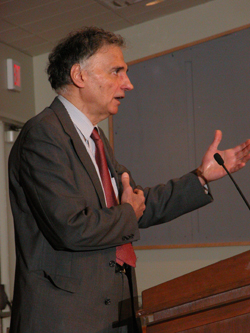 |
| Ralph Nader: “Growing up corporate is probably the antithesis of a liberal education.” |
4:40 p.m., May 2, 2003--Ralph Nader, longtime consumer advocate, lawyer and author, encouraged Americans to raise their expectations of the U.S. government in response to corporate influence on politics in a speech Thursday evening, May 1, in Clayton Hall.
“Here’s the challenge,” Nader said. “How much time will you put into public citizen duties? Once you dedicate the time everything follows. You’ve got time. You’ve got energy. You can get the connections.
“If you don’t, your world will be more and more controlled by artificial entities called corporations.”
Nader, who is best known for his 2000 presidential campaign as the Green Party candidate, said multinational corporations control a large range of our society, from media outlets such as television news and newspapers, to funding for politicians, as well as how America culturally defines concepts such as beauty.
“You look at each other through certain measures and standards,” he said. “The cosmetic industry has allowed our definition of beauty to be commercialized. America’s version of beauty does not evoke passion, courtesy, wit or just being there when someone needs you.”
Nader said college students, in particular, have the assets to facilitate change.
“Growing up corporate is probably the antithesis of a liberal education,” he said. “You come to the University looking to gain a skill, socialize a bit, play some sports and get a job. There’s more to it than that.
“When’s the next time you’ll have your own newspaper, radio station or TV station? When’s the next time you’ll have access to physics and biology labs with experts from the University to tap into? When again are you going to have so much idealism before the world shuts it down?”
Nader said working to change government policy may seem like a daunting task, but anyone can do it with dedication. He used his involvement as a law school student in the creation of legislation that forced automobile manufacturers to follow safety standards as an example. Nader’s Center for Auto Safety, a public interest research organization, was established in response.
“I didn’t have any connections,” he said. “Nobody knew my name. I didn’t have influential parents. I didn’t have any money.
“It just takes a desire to move to a significant position in your society where you do not crawl through life complaining you can’t take on City Hall or Du Pont or Exxon, whoever it may be. There are all kinds of forces in this society that feed this kind of surrender.”
Nader termed such “surrender” as “complicity by passivity.” He said the United State’s forbearers were able to accomplish amazing changes without the many technologies we rely on today.
“They had no electricity, no e-mail, no automobiles,” he said. “They just had their hearts, their heads and their feet. Why can’t we do that today?”
Nader said “growing up corporate” is one reason because it gives individuals symbols to cling to that are not a reality. He said the American flag’s current symbolic value is proof.
“[The flag] does not stand as a banner that allows our president to wage an international and unlawful war,” he said. “It does not stand as a fig leaf to represent how we’ve neglected so many Americans.
“You know what the flag stands for – the last few words of the Pledge of Allegiance—‘with liberty and justice for all.’ But it’s only going to stand for that if we stand up for liberty and justice for all, too.”
Nader’s speech was part of UD’s Du Pont Scholars Lecture Series, “Passing the Torch: An Interdisciplinary Look at a World Poised for Change.” For information on upcoming speakers, call 831-1195.
Article by Amie Voith, AS 2003
Photos by Duane Perry |

